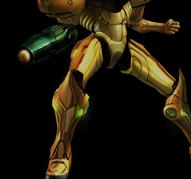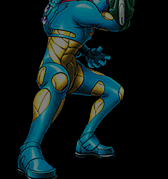This interview originally appeared in Nintendo Dream vol. 85 (March 2003), but was republished on the official Metroid Prime & Fusion website in their interview section in collaboration with Nintendo Dream. These interviews have never been translated until now, and are available exclusively at the Metroid Database!
| — | When you were making this Metroid, what did you find really enjoyable? |
| Sakamoto | The truth is, until now I mostly haven’t been making games just with internal teams. Because of that, since this time it was just made internally, I was able to see even the good parts and bad parts, and I received feedback only from R&D1 members who were making it, so I think I had a good experience. Well, when we made the game, although it was usually like that, my memories of it taking shape make me happy, and although the very beginning and very ending of the design process was especially happy, the middle was sloppy. (Laughs) But from about one month before the final version was finished, everyone’s expressions changed for the better. |
| — | Tanabe-san, what made you happy? |
| Tanabe | What made me happy? That’s a tough question. No, well, perhaps releasing it in Japan; if I think about it, that’s what makes me happiest. When this work began, the truth is I was very anxious. I had personally not made a first-person game, and furthermore, speaking of Metroid, it had been made last year’s holiday sales showpiece. Well, when I started to get involved, the game hadn’t taken shape. Moreover, I wasn’t just making one game, I was working on several simultaneously. |
| — | You were also involved with Cubivore. |
| Tanabe | At that time, Cubivore was also set in motion. And I was also first involved with Eternal Darkness. However, it was absolutely impossible for me to do both games, and although I was having help from other people, I was always worried if it would be finished properly. Because of that, when we showed last year’s E3 version, my first thought was, “It better go well!” |
| — | But although you were worried about just that, it was given good reviews in America. |
| Tanabe | That was my happiest moment. |
| Sakamoto | At last year’s E3, I was incredibly worried. I thought, “This is terrible!” At that time, I was so confused, I yelled out “Metroid Confusion!” (Laughs). The director asked me, “What, Fusion?”, and I answered, “No, Confusion!” (Laughs) |
| Everyone | Laughs heartily |
| — | Yamamoto-san, what did you enjoy about making the music? |
| Yamamoto | Of course, I was happy when it received good reviews overseas. Beyond that, with the development phase, it was a challenge to differentiate from so-called stereotypical game music, so I constructed a Metroid-ish dark, futuristic outer-space setting as a natural environment using surreal sound expressions, and honestly, I was very nervous. |
| — | That’s why it doesn’t have good tempo and rhythm like other games. |
| Yamamoto | Exactly. With surreal musical expression, you have to compose even the rhythm and melody. Although I was very nervous about whether that sound space would be accepted, I was glad when it was awarded Best Game Music of the Year! (Laughs) |



